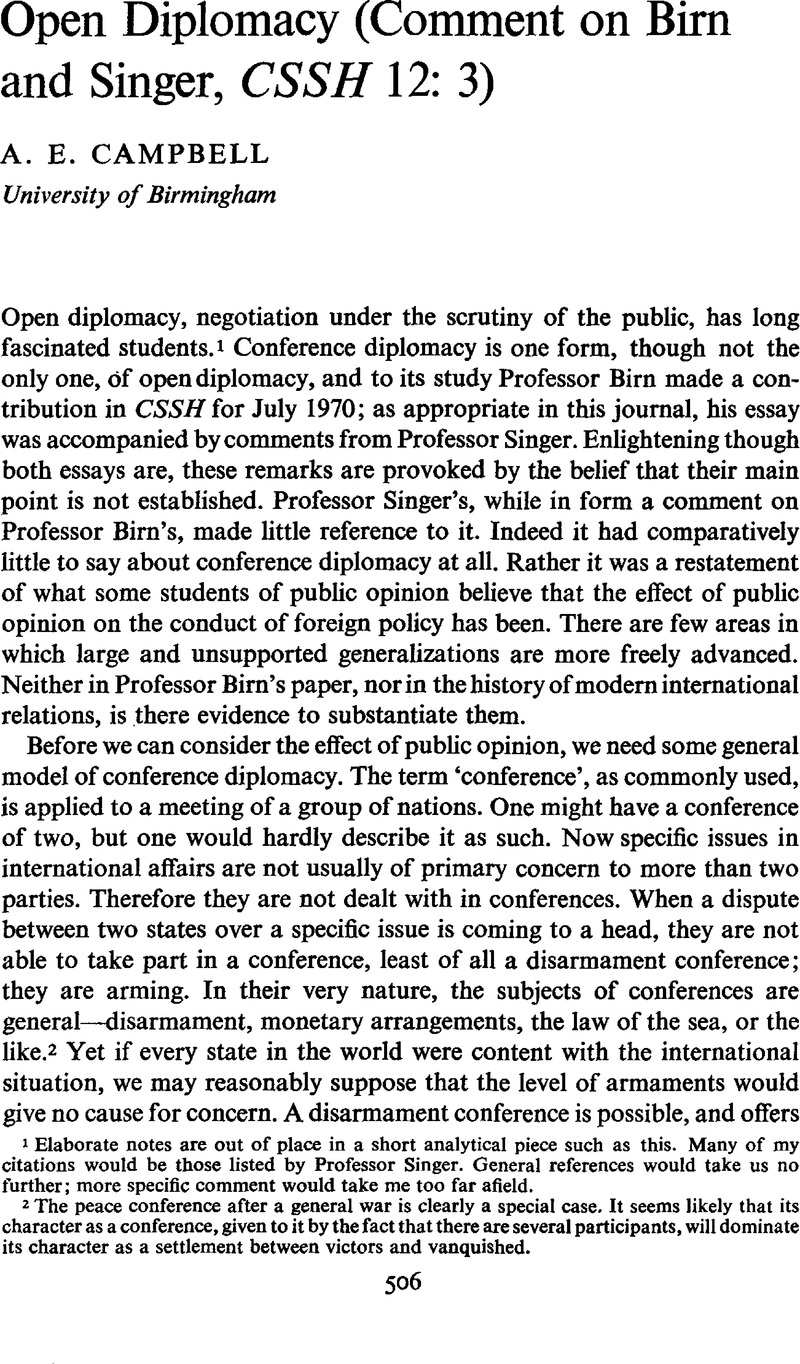No CrossRef data available.
Article contents
Open Diplomacy (Comment on Birn and Singer, CSSH 12: 3)
Published online by Cambridge University Press: 03 June 2009
Abstract

- Type
- Debate
- Information
- Copyright
- Copyright © Society for the Comparative Study of Society and History 1972
References
1 Elaborate notes are out of place in a short analytical piece such as this. Many of my citations would be those listed by Professor Singer. General references would take us no further; more specific comment would take me too far afield.
2 The peace conference after a general war is clearly a special case. It seems likely that its character as a conference, given to it by the fact that there are several participants, will dominate its character as a settlement between victors and vanquished.
3 Birn, 298, 299–301, 317–18.
4 Birn, 299–307. On this point see Millis, Walter, Arms and Men (Capricorn Books), 1967: 247.Google Scholar
5 Birn, 299, 307–8, 317–19.
6 Birn, 298, 311–12, 309–11, 314–16.1 have found it equally hard to establish the influence of public opinion on the disarmament conference of 1932.
7 For this reason, of course, conferences have sometimes been held in countries unconcerned with the matter under discussion; but that practice would surely have become standard long ago had the advantage been clear and great.
8 Birn, 311.
9 This is the point at which politicians, unlike historians, must respond to public opinion. A dramatic withdrawal, such as that of Orlando from Versailles, for example, might have served Briand better, and France no worse. It is instructive to read in this context Harold Nicolson's account of the Italian maneouvres at Versailles and Wilson's response to them. Peacemaking 1919, Bk. I, Ch. 7.
10 As he usually is, though not, of course, always. Professor Birn rightly reminds us that Lloyd George was head of a coalition. It may well be that he could see the advantage to himself of sending as leader of the British delegation a prominent member of the rival party. Briand's position was much more analogous to that of an eighteenth-century British minister, though he lacked the royal support which could sometimes sustain such a minister for a time against unpopularity.
10 A view held firmly, to take one example, by Theodore Roosevelt. See Roosevelt, to John, Hay (personal), February 18, 1900, in Morison, E.E., ed., The Letters of Theodore Roosevelt, II, 1522.Google Scholar
12 Counter-examples, I believe, prove on examination to be less than sound. Consider the Vietnam entanglement, of which it has often been said that the American people did not know the extent of their government's undertakings until it was too late. The United States could, and would, have withdrawn long since had Americans been united in the conviction that their country should withdraw; nor, given that unity, would, or should, previous undertakings have kept the United States in Vietnam. To multiply examples is needless.
13 Singer, 322.
14 An example of the first category may be the recent British debate over the Common Market, which indeed divided both major parties, for perfectly legitimate reasons. An example of the second category may be the sort of consensus that party politicians in a country like Finland, living in the shadow of a giant neighbour, must reach.
15 Singer, 322,1. 34; 323,1. 9.
16 Singer, 325.


